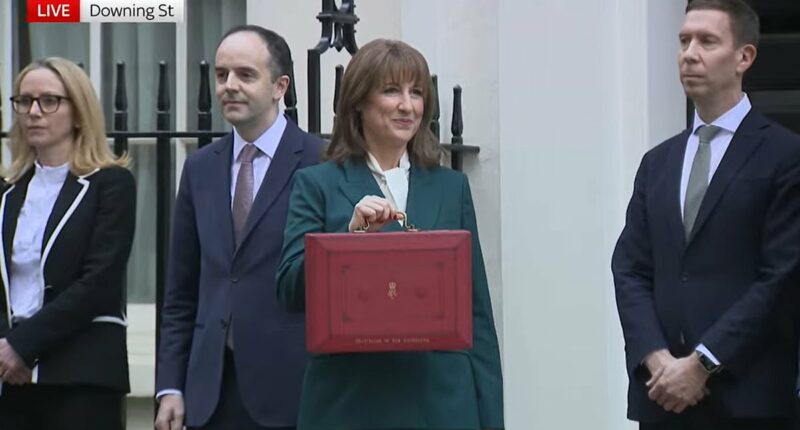Share this @internewscast.com
The unveiling of the Budget spiraled into chaos today with a significant mishap involving Rachel Reeves’ ambitious tax proposal. Astonishingly, details of this major fiscal strategy were leaked before she could even make her official announcement.
In an unexpected twist, the Office for Budget Responsibility (OBR) prematurely released its analysis of the Chancellor’s fiscal plans a mere thirty minutes before the eagerly anticipated session was set to commence. This untimely disclosure revealed plans for a £30 billion tax increase by the fiscal year 2030-32, extending the current thresholds freeze for an additional three years. Consequently, about 25% of the population may find themselves subjected to higher or top-rate taxes by then.
This extraordinary leak unfolded just moments after Ms. Reeves made a public appearance with her iconic red box outside 11 Downing Street. Photographs from the Commons captured the moment she was handed a phone by minister Torsten Bell, presumably with news of the unexpected development.
When Ms. Reeves finally addressed the assembly, she did not hesitate to point fingers at the watchdog, attributing the leak to them and expressing her frustration by labeling it as ‘deeply disappointing and a serious error on their part’.
Images from the Commons appear to show the moment she was handed a phone by minister Torsten Bell, informing her of the development.
When she finally rose to speak, the Chancellor threw the blame entirely on the watchdog saying it was ‘deeply disappointing and a serious error on their part’.
The stealth raid will milk thousands of pounds more from millions of struggling households – with ministers already conceding it will demolish Labour’s promises.
Just 12 months ago Ms Reeves said she would not prolong the freeze because it would ‘hurt working people’.
However, Ms Reeves is splashing the cash on handouts to placate increasingly mutinous Labour MPs.
The two-child benefit cap is set to be axed, leaving around 18,000 large families in line to pocket an extra £14,000.
The OBR said 560,000 families are in line for extra cash, costing around £3billion a year.
In a sop to hard-pressed households, fuel duty has been frozen for five months, although it will then rise in stages.
Other measures laid out in the documents include:
- A brutal assault on ‘salary sacrifice’ tax reliefs – such as pension contribitions – will raise another £4.7billion.
- Increasing the tax rates on dividends, property and savings income by 2 percentage points, raising £2.1 billion;
- A new mileage-based charge for EVs and hybrids from April 2028, raising £1.4billion;
- A tax on gambling bringing in £1.1 billion a year – although horse racing is exempted;
- A ‘mansion tax’ of up to £7,500 a year on properties worth over £2million, raising £400million;
- The U-turns on benefits curbs and scrapping winter fuel allowance have cost £7billion.

Images from the Commons appear to show the moment she was handed a phone by minister Torsten Bell, informing her of the development

Tax thresholds are frozen for another three years. Around a quarter of the working population will be paying higher or top rate tax by then

The OBR has launched an inquiry into the leak

Rachel Reeves brandished her red box outside 11 Downing Street as she gears up to impose another scorching round of tax hikes in her big set-piece at 12.30pm

The Chancellor conducted the traditional pre-Budget photo op outside No11

Rachel Reeves briefed the Cabinet on her Budget plans this morning, as she admitted Britain is ‘angry’

The PM chaired Cabinet ahead of the make-or-break moment in the House of Commons later
The OBR has apologised and launched an investigation into the blunder, which sparked turmoil in Westminster and on markets.
It tees up a dramatic session in the Commons as Ms Reeves and Keir Starmer try to get back on an even keel.
Just a year ago Ms Reeves vowed she would not be coming back for more taxes.
The OBR document revealed the decision to freeze income tax thresholds for three years – longer than the two years expected – will drag 780,000 more people into paying the basic rate and 920,000 into the higher rate band.
That is compared to the original plan for the freeze to end in 2028.
Cabinet met this morning to formally sign off the plans, with the Pound and yields on gilts – the way the government borrows money – subdued.
Sir Keir told them the Budget represented the ‘kind of country we want to live in’, adding that the ‘fight was between renewal or decline – and this government chose renewal’.
Ms Reeves told ministers that she had made the ‘fair and necessary choices to strengthen our foundations and drive down the cost of living’.
There have been warnings that markets will hammer the Pound and drive up the cost of servicing the UK’s massive debt mountain unless the Chancellor shows she has a ‘credible’ plan.
Ms Reeves already has the grim distinction of having delivered the biggest tax-raising Budget on record – around £41billion.
She looks on track to increase taxes by more in just 16 months than Gordon Brown managed during a decade in No11.
The humiliating ditching of wider reforms to welfare and the reversal of winter fuel allowance cuts have contributed to a grim situation for Ms Reeves.
She has already blamed a bewildering array of factors from Brexit and Tory austerity to Donald Trump for her woes. The OBR watchdog is thought to have downgraded productivity forecasts after concluding they were overoptimistic.
But businesses have pointed to the huge Budget national insurance raid for crushing growth, and lashed out at the ‘fandango’ of weeks of confused briefing about the contents of the Budget.
In a video released ahead of the Budget, the Chancellor tried to put a brave face on the country’s plight.
She said things were improving with ‘wages rising faster than inflation, hospital waiting lists coming down, and our economy growing faster and stronger than people expected’.
‘But I know there is more to do,’ she said. ‘I know that the cost of living is still bearing down on family finances, I know that people feel frustrated at the pace of change, or angry at the unfairness in our economy.
‘I have to be honest that the damage done from austerity, a chaotic Brexit and the pandemic were worse than we thought.
‘But I’m not going to duck those challenges, and nor will I accept that our past must define our future. It doesn’t have to.’
She described the Budget as being for ‘the British people’ and said the Government would work with them to ‘build a fairer, stronger and more secure Britain’.
The Chancellor insisted she will use her Budget to introduce measures to tackle the cost-of-living crisis, as the beleaguered Government hopes to keep backbench Labour MPs on side.
Ms Reeves has vowed to reduce the costs of Government debt and is expected to take steps to increase the buffer she has against future economic shocks to avoid having to keep coming back for more tax in future budgets.
‘Today I will take the fair and necessary choices to deliver on our promise of change,’ Ms Reeves said ahead of the Budget.

Cabinet met this morning to formally sign off on the Chancellor’s plans

Ministers seemed in high spirits as they left 10 Downing Street

Health Secretary Wes Streeting has been at the centre of leadership speculation

The Chancellor is gearing up to impose another scorching round of tax hikes in her big set-piece at 12.30pm as she desperately tries to fill a black hole in the finances
She added: ‘I will not return Britain back to austerity, nor will I lose control of public spending with reckless borrowing.
And I will push ahead with the biggest drive for growth in a generation.’
Cabinet minister Darren Jones admitted the tax threshold freeze is ‘practically’ a tax rise as he toured broadcast studios this morning.
Asked on Sky News whether people will ‘pay more income tax’, he replied: ‘Only if their pay goes above the threshold. If their pay doesn’t change, then it doesn’t change their situation.’
But pressed that inflation would inevitable increase wages in cash terms, he added: ‘If their pay goes above the threshold, then they pay more than when they were below the threshold.’
Asked by presenter Sophy Ridge whether that was a ‘yes’ to it being a tax rise, he said: ‘Practically, yes. If they earn more above the threshold than they did before.’
The benefit cap limits means-tested benefits such as universal credit and child tax credit payments to the first two children, costing affected families a typical £3,455 in lost benefits for each additional child.
Figures produced by the Department for Work and Pensions (DWP) show that 470,000 families are now affected by the policy.
About 59 per cent have at least one adult in work, leaving almost 200,000 in which no-one has a job.

Almost all earners would be hit by a freeze extension, according to the IFS
Almost two-thirds (297,000) have three children, while a quarter (117,000) have four. A further 37,000 affected families have five children, while 18,260 are listed as having ‘six or more’.
Tory policy chief Neil O’Brien said those with six or more children were in line for a windfall worth more than £14,000 a year.
He added: ‘Last year the Chancellor said lifting the cap was unaffordable but Labour MPs have worked out she can be pushed around.
‘It means you are going to see some families receiving very large sums from the taxpayer, while the Chancellor is saying it is necessary to raise taxes on everyone else.
‘It blows a hole in her argument that she has no choice but to raise taxes because of Brexit or the Tories or the Battle of Hastings. In fact, it shows she is quite happy to raise taxes to spend billions more on benefits.’
Critics of the cap claim it has worsened child poverty, and scrapping it has become an article of faith for many Labour MPs. But the potential rise in benefits is so large that some could be left with little incentive to work.
What can we expect in the Budget?
Rachel Reeves’ preparations for her latest Budget have been branded a ‘shambles’ by economists.
When she finally delivers her fiscal package at 12.30pm, Ms Reeves will end months of rumours and briefings about possible new levies.
The uncertainty caused by the speculation is judged to have choked off economic growth, by causing ‘paralysis’ among UK businesses and consumers.
Sir Lindsay Hoyle, the Speaker of the House of Commons, has even mocked the ‘hokey cokey’ Budget process, following Ms Reeves’ chaotic U-turn on income tax.
At the beginning of this month, the Chancellor laid the groundwork for a manifesto-busting hike to income tax rates.
But she was later revealed to have scrapped plans to increase income tax rates by 2p, while cutting National Insurance by the same amount.
She is instead expected to announce a ‘smorgasbord’ of other levy hikes as she scrambles to fill a multi-billion pound hole in the public finances.
So, following months of chaotic speculation, here’s what the Chancellor is expected to announce…
A ‘mansion tax’
The owners of more expensive homes face being hit with a new ‘mansion tax’ worth an average of £4,500.
The property levy will reportedly be collected through council tax bills and charged on homes worth more than £2million.
More than 100,000 properties would be impacted by such a charge, which could raise around £450million for the Treasury.
The move will reportedly see the revalulation of some of the most valuable properties across council tax bands F, G and H.
Homeowners are expected to be allowed to defer paying the tax until they move house or die, to avoid people having to sell up to cover the cost.
Experts have warned it will damage the property market at a time when the Government is looking to build 1.5million more homes.
A freeze on income tax thresholds
The Chancellor is expected to freeze the on income tax thresholds for an extra two years to 2030.
Is she also keeps National Insurance thresholds at their current rate, Ms Reeves would raise around £8billion with the move.
Freezing income tax thresholds is known as a ‘stealth tax’ as it drags more people into paying tax for the first time, or shifted onto higher rates, as wages go up.
A current freeze on income tax thresholds, first introduced in April 2023, was due to expire in 2028.
A raid on workplace pensions
Ms Reeves is targeting a £3billion raid on the ‘salary-sacrifice’ schemes used by millions of private-sector workers.
Under salary-sacrifice schemes, workers accept a lower wage each month and their employer makes an equivalent pension contribution.
This cuts their National Insurance liability, with firms and staff usually splitting the saving.
National Insurance is charged at 15 per cent for employers and at 8 per cent on employee earnings less than £50,270, with 2 per cent charged on income above that.
The tax break was created to encourage pension saving and costs the Treasury £4billion a year.
Ms Reeves has been considering capping the salary that can be ‘sacrificed’ at just £2,000, saving the Treasury about £2billion.
But the Financial Times reported that the Treasury now wants to save £3billion to £4billion, suggesting it will be scaled back further or axed.
A survey by the Confederation for British Industry (CBI) suggested few firms would absorb the costs if salary sacrifice schemes were axed, or National Insurance was charged above a new cap.
They warned workers’ pension pots could be worth tens of thousands of pounds less if Ms Reeves presses ahead with a Budget raid.
A pay-per-mile tax for electric cars
The Chancellor is said to be considering a 3p per mile tax for electric vehicles (EVs).
It is estimated this will increase the average cost of owning an EV by £276 a year, while it would raise about £375million for the Treasury each year based on the number of EVs now on the road.
A pay-per-mile levy is designed to plug the looming gap caused by a collapse in fuel duty as drivers move away from petrol and diesel cars.
But experts say it could cause the EV market to stall.
In a bid to strengthen the EV market, Ms Reeves will add £1.3billion to a grant that knocks up to £3,750 off the price of an electric vehicle.
It will be part of a package that will also see £200million go towards the rollout of charging points.
Campaigners have urged the Chancellor to keep fuel duty frozen at her Budget, in order to protect hard-pressed motorists.

The Chancellor is said to be considering a 3p per mile tax for electric vehicles (EVs)
Scrapping the two-child benefit cap
Ms Reeves is widely expected to bow to pressure from Labour MPs by scrapping the two-child benefit cap.
This currently prevents parents from claiming Universal Credit or child tax credit for a third or additional child born after April 2017.
It is estimated that scrapping the cap entirely, which is being demanded by both Labour MPs and charities, would cost around £3.5billion a year.
The Tories have warned it would be ‘irresponsible’ to scrap the two-child limit – and add billions more to the welfare bill – at a time when Ms Reeves faces having to hike taxes to fill a hole in the public finances.
As well as scrapping the two-child benefit cap, the Chancellor is expected to confirm working-age benefits – such as Universal Credit, PIP, and child benefits – will be uprated in line with inflation at a cost of around £6billion.
Fuel duty freeze
Ms Reeves is poised to continue the long-running freeze on fuel duty, as well as keeping the 5p reduction introduced by Rishi Sunak.
However, she is likely to neutralise that £3billion cost by telling the OBR she still plans to push up duty in 2027. That means it will not affect her spending balance at the fiscal horizon.
The watchdog has previously complained about these tactics, but appears powerless to prevent them.
A cut to the ISA limit
The Chancellor is poised to slash the annual cash ISA limit to £12,000 from £20,000.
It is part of an effort by Ms Reeves to encourage Brits to instead invest their savings into stocks and shares.
But the House of Commons Treasury committee has warned that cutting the cash ISA allowance is ‘unlikely to incentivise people to invest their cash in stocks and shares’.
They said ‘knock-on effects’ could include a less competitive mortgage market as building societies depend on cash ISA savings as a critical funding source for their lending.
A ‘taxi tax’
Ahead of the Budget, the Treasury refused to rule out slapping 20 per cent VAT on private hire fares.
Industry experts reckon a ‘taxi tax’ would raise £750million a year for the Treasury – but would add £2 to £3 to a typical £12 journey.
At present, taxi operators outside London do not have to charge VAT on journeys because their drivers are self-employed and they typically remain under the VAT threshold by earning less than £90,000.
Women’s rights campaigners have urged the Chancellor not to do anything that hikes the cost of taxis as it would put more vulnerable people at greater risk.
They pointed out that many women choose to get a taxi late at night, rather than walking home in the dark or relying on public transport.
A consultation on the VAT treatment of private hire vehicles was launched under the previous Tory government following a court case.
A ‘milkshake tax’
Ms Reeves is introducing a ‘milkshake tax’ by ending the exemption dairy-based beverages have from tax on sugary drinks.
The ‘sugar tax’ – formally known as the Soft Drinks Industry Levy – was introduced in 2018 to combat obesity.
But milkshakes were left out due to fears that hiking the price would cut children’s calcium intake.
Producers pay at least 18p per litre on soft drinks containing 5g or more of sugar per 100ml.
As well as ending the dairy exemption, the government is cutting the threshold to 4.5g per 100ml.

Ms Reeves has suggested she could raise taxes on betting firms at the Budget and said the Treasury had been ‘taking evidence’ on the issue
New gambling taxes
Ms Reeves has suggested she could raise taxes on betting firms at the Budget and said the Treasury had been ‘taking evidence’ on the issue.
Former Labour PM Gordon Brown has been among those calling for the Chancellor to hike levies on the ‘undertaxed’ gambling industry.
He has urged Ms Reeves to increase various gambling taxes in order to raise revenues to cover the cost of scrapping the two-child benefit cap.
But the Betting and Gaming Council, which represents gambling companies, warned the ‘economically reckless’ plan would push gamblers into the black market.
Minimum wage rises
The Chancellor has confirmed that the minimum wage for workers over 21 will rise by about 4.1 per cent to around £12.71 an hour.
She has also accepted a recommendation from the Low Pay Commission, an independent body that advises the Government on minimum wage rates, for a 8 per cent to the current £10 an hour for workers aged 18-20.
In its manifesto prior to last year’s general election, Labour promised to ensure all adults are entitled to the same minimum wage.

















